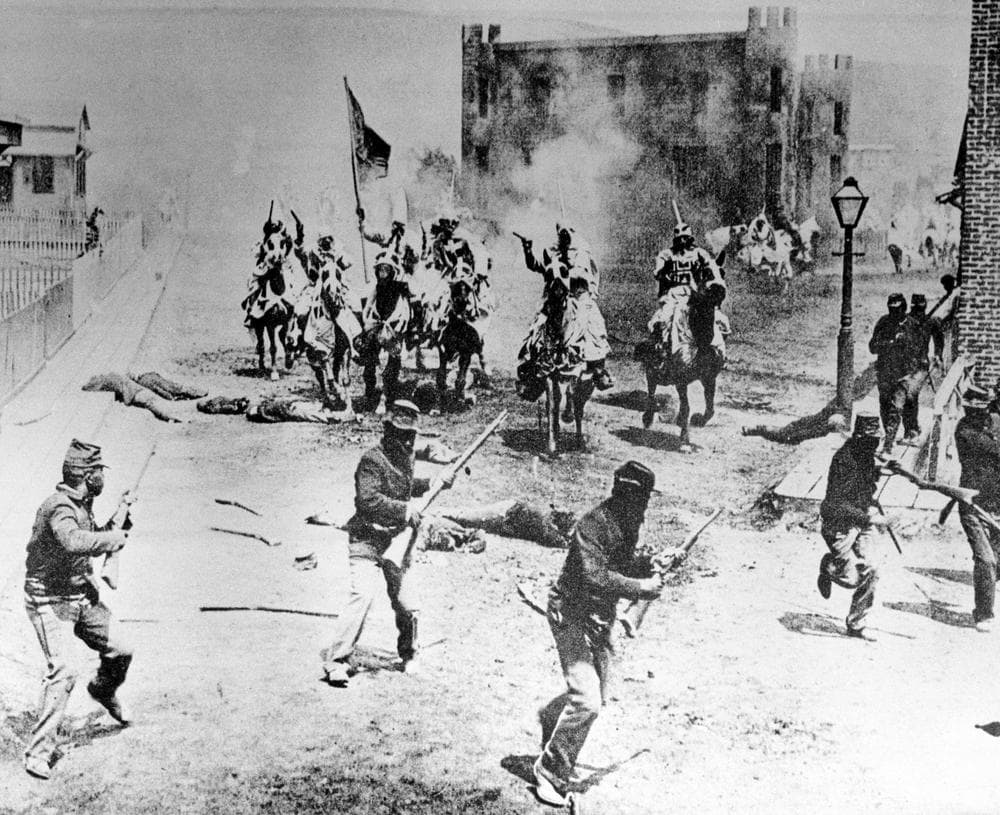Advertisement
Writing History With Blood: Why '12 Years A Slave' Matters
Most of us are introduced to history through film. Undoubtedly, the most provocative films begin with five simple words: “Based on a true story.” In 1915, D.W. Griffth’s film “Birth of a Nation” was released to audiences around the country. The blatantly racist film told the story of the rise of the “heroic Klansman,” and the ultimate triumph of white supremacy after Reconstruction. President Woodrow Wilson held a historic screening at the White House and after seeing the film declared, “It is like writing history with lightning… My only regret is that it is all so terribly true.”
Undoubtedly, the most provocative films begin with five simple words: 'Based on a true story.'
With the debut of Steve McQueen’s “12 Years A Slave,” film critics, journalists, and scholars alike will all attempt to appraise what this film will mean and we will all undoubtedly fall short. Simply put, it is the most authentic portrait of the African American experience and a fluent rendering of the violence, cruelty, and the hell of slavery in America’s past. I, among many, left an early screening speechless, stunned, and grief-stricken. It is by the far the most emotionally gripping treatise on slavery in the cannon of feature film.
It tells the story of Solomon Northup (Chiwetel Ejiofor), who lived as a free African American in Saratoga Springs, New York in 1841 when he was kidnapped, and sold into slavery for 12 years. Northup’s narrative quickly became a best-seller within the ranks of other famous slave narratives, such as those by Frederick Douglass and Harriet Jacobs. His narrative is a detailed account of suffering, despair, and survival. What is unique about Northup’s story is that it has become one of the only stories of a free man who was subsequently enslaved and lived to regain his freedom.
Yet, there has never been anything like it. McQueen is the first black director to take on a film of this nature — the same can be said of screen writer, John Ridley, who is also black. “12 Years” is completely Northrup’s story: brilliantly acted and beautifully human.
What is perhaps most refreshing about the film is that it defies all of the problematic and formulaic troupes of Hollywood: where black characters are consistently regulated to the periphery and benevolent white heroes, saviors, and protagonists shape the narrative of the story (i.e. “Glory,” “Amistad,” “The Help,” “Lincoln,” “Django Unchained,” and so on). Nor is it a story where white characters solve the protagonist’s problems. Even the role of Brad Pitt’s character, Samuel Bass, a white carpenter from Canada who plays a pivotal role in Northup’s rescue is noticeably minimized. The film does not serve the dominant Hollywood ideology of white supremacy and it does not replace history with its own historical mythology of slavery. It makes clear that slavery was not, nor should it be portrayed as, a musical or spaghetti western.
It makes clear that slavery was not, nor should it be portrayed as, a musical or spaghetti western.
One of the most gripping aspects of the film was its sexual politics. There is no benevolent mistress teaching the slaves to read. True to historical form, the mistress is a jealous and enraged woman who reserves the bulk of her cruelty for the master’s favorite bondwoman, Patsey (Lupita Nyong'o). In addition, rape is a constant reality for women the moment after puberty. It is nearly impossible to have a relationship that is not ripped apart by the auction block or soiled by the master’s sexual desire. Even Alfre Woodard’s character, mistress Harriet Shaw, who was a former slave who apparently married her master, was not as unusual a circumstance as one might think. In the famous slave narrative “Incidents in the Life of a Slave Girl,” Harriet Jacobs was compelled to marry to Samuel Sawyer, a free white lawyer, to protect herself from the sexual advances of James Norcom, Harriet’s master.
Overall, McQueen highlights that slavery at its core is violent oppression. And the violence is not merely carried out by the whippings (which were intensely difficult to watch), or sexual assaults, but even in the mundane rituals and practices of song and dance. When master Epps (Michael Fassbender), awakens his slaves in the middle of the night to dance, it is nothing more than a form of coercive cruelty and staged servitude. The film begs the questions: Whose ease is allayed by song and dance? And, since truly no place is free from the unblinking stare of subjugation, is authentic pleasure even possible among the enslaved?

Now, almost 100 years after D. W. Griffth’s “Birth of a Nation,” audiences are finally watching a film that is authentic in its retelling of the true story of Solomon Northup. It gives voice to countless others who suffer in the shadows of the romanticism of the antebellum South. My hope is that people will use the film as a starting point, but then move beyond that into dealing with interpersonal relationships and the systemic structure of racism that was put in place by slavery and still persists today.
The film reminds us that some of the best stories can be pulled from the pages of America’s troubled past. In my humble opinion, it is like writing history with blood… my only regret is that it is all so terribly true.
Kellie Carter Jackson is currently teaching a course at Harvard on “Hollywood and History: Understanding American Slavery through Film.” She is also co-editing the forthcoming book, “Reconsidering Roots,” with Erica Ball.
Related:
This program aired on October 23, 2013. The audio for this program is not available.
